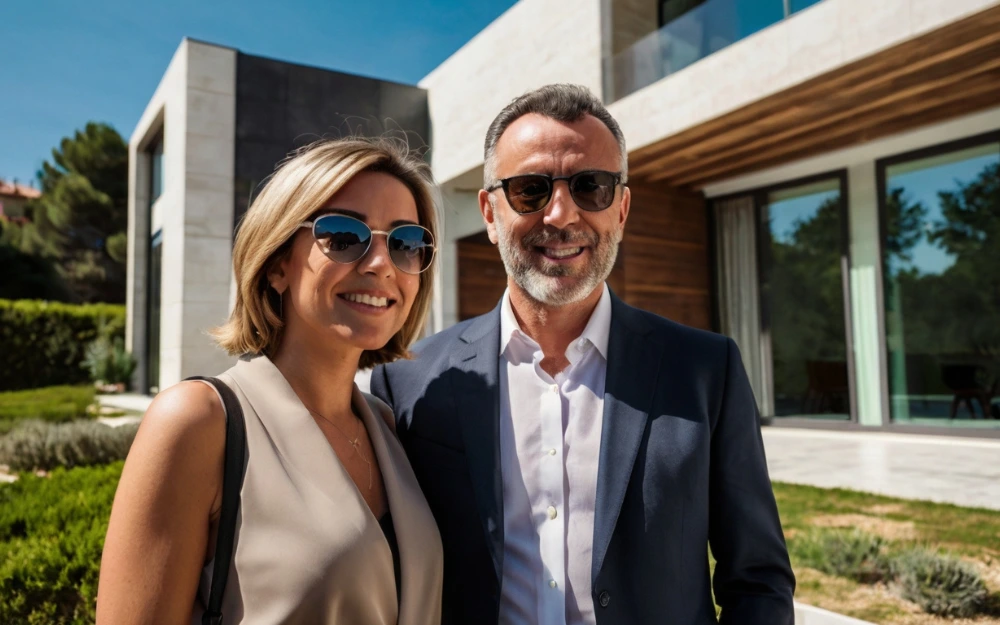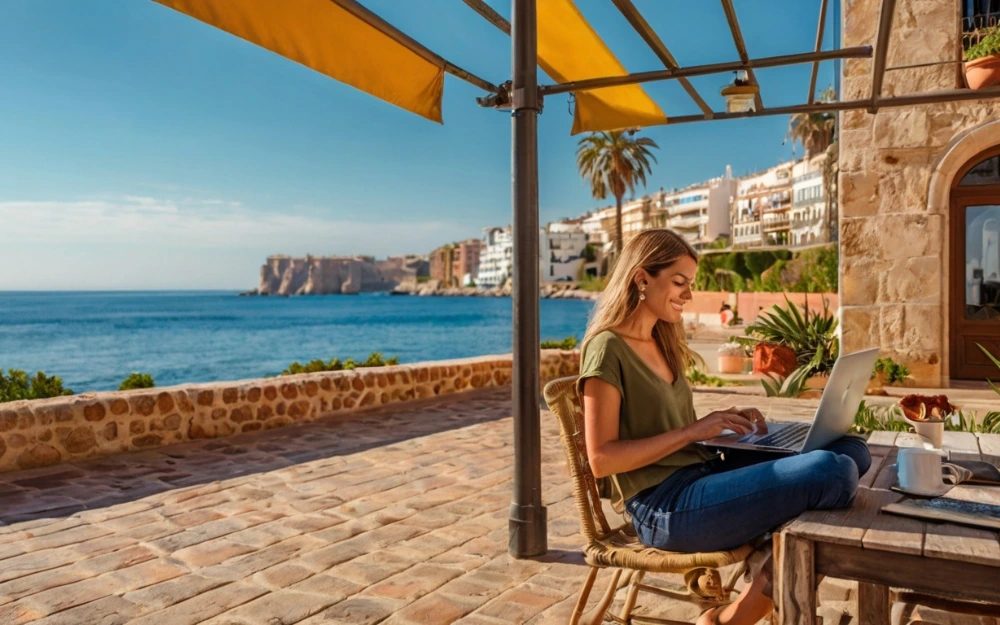At Golden Partners, a boutique law firm specializing in Real Estate law in Spain, we are often asked, “Can foreigners buy Real Estate in Spain?” The short answer is yes. Spain’s property market offers numerous opportunities for foreign investors, but there are essential legal steps and considerations to ensure the process runs smoothly and securely. In this guide, we will outline everything foreign buyers need to know to confidently purchase property in Spain.
Can foreigners legally buy Real Estate in Spain?
What are the legal requirements for foreigners?

Foreigners are fully entitled to purchase property in Spain. However, there are several legal formalities that must be followed when you wonder how to buy Real Estate in Spain. The most critical requirement is obtaining an NIE (Foreigner’s Identification Number), which is necessary for any legal transaction in Spain, including purchasing Real Estate.
Are there any restrictions for non-EU citizens?
Non-EU citizens may wonder if they face additional restrictions when buying property in Spain. The good news is that Spain does not impose any significant limitations on foreign property buyers, regardless of their nationality. However, there are certain areas deemed “strategic,” such as military zones, where non-EU buyers may need special permission to purchase property.
In all other cases, there are no special limitations beyond the same requirements that apply to Spanish citizens. The only difference, as we will see later, lies in the tax obligations you may incur as an investor when investing in Real Estate in Spain, depending on whether you acquire tax residency in Spain or are taxed as a non-tax resident in Spain. Therefore, when our clients ask us, “Can Americans buy Real Estate in Spain?”, the answer is yes, as well as any other nationalities.
Is it necessary to be a resident to purchase property in Spain?
No, it is not necessary to be a resident of Spain to buy property. Non-residents, whether they are EU citizens or from outside the EU, are free to buy property. Residency status only becomes relevant if you plan to stay long-term or apply for a mortgage in Spain.
Even Spaniards themselves continue to buy Real Estate in Spain when they move abroad. As a result, more and more international investors are showing interest in Real Estate in Spain, as it offers great benefits and returns on their investment. In 2023, Spain’s Real Estate market experienced a significant price increase of approximately 10.9%, based on official data. This growth was consistent throughout the year, with increases recorded in each quarter. Key contributing factors include a persistent imbalance between supply and demand, rising construction costs, and strong market activity from both local and international buyers. Major urban areas such as Madrid, Barcelona, and coastal regions were particularly affected. This price appreciation reflects broader trends in the market, which has remained resilient despite economic challenges.
In 2023, Spain's Real Estate market experienced a significant price increase of approximately 10.9%, based on official data.
This growth was consistent throughout the year, with increases recorded in each quarter. Key contributing factors include a persistent imbalance between supply and demand, rising construction costs, and strong market activity from both local and international buyers. Major urban areas such as Madrid, Barcelona or Sevilla and coastal regions were particularly affected. This price appreciation reflects broader trends in the market, which has remained resilient despite economic challenges.
Key legal steps for foreign investors to buy property in Spain
Obtaining an NIE
An NIE (Foreigner’s Identification Number) is required to purchase property in Spain, sign contracts, pay taxes, and open a bank account. This identification number is crucial and can be obtained through a Spanish consulate in your home country or within Spain itself.
You could register with a valid passport, but the optimal option is to obtain the NIE, as you will need it for any procedure related to the purchase of Real Estate in Spain. It has a symbolic cost of only 10 euros.
Opening a Spanish bank account for transactions
It is highly recommended that foreign investors open a Spanish bank account to manage property-related payments, including taxes, utility bills, and mortgage payments. This facilitates smoother transactions and allows you to meet all the necessary financial obligations.
Understanding taxes and fees for foreign property buyers
Foreign buyers are subject to the same taxes and fees as Spanish residents when they buy Real Estate in Spain. This includes property transfer tax (between 6% and 10% depending on the region), notary fees, registration fees, and legal costs. You should be fully aware of these expenses before entering into any agreements.
What types of Real Estate can foreigners buy in Spain?
Residential property: apartments, houses, and villas
Foreigners can purchase a wide range of residential properties in Spain, including apartments, houses, and luxury villas. The Real Estate market is diverse, with opportunities for both primary residences and vacation homes. If you wonder where to buy Real Estate in Spain, including luxury options, you might read more in this other post on our website.
Commercial property investments
Spain is also open to foreign investment in commercial real estate, such as office buildings, retail spaces, and industrial properties. Many investors take advantage of Spain’s growing economy and vibrant tourism industry.

Can foreigners buy rural or agricultural land?
Yes, foreigners can buy rural or agricultural land in Spain, although you may need to navigate additional regulations depending on the location and intended use of the property.
The buying process for foreign investors in Spain
The role of a notary and legal advisor in the property purchase
When you decide to buy Real Estate in Spain, a notary plays an essential role in ensuring the legality of your property transaction. At Golden Partners, we recommend engaging a bilingual legal advisor of our team who can guide you through the legalities, draft the contracts, and ensure your interests are protected.
Signing the preliminary purchase contract
Once you find a property, the first formal step is signing the known in Spanish as Contrato de Arras, or preliminary purchase agreement. This contract typically involves paying a deposit, which serves as a commitment from both buyer and seller.
Completing the final purchase at the notary
The final step in the buying process is signing the deed of sale (in Spanish known as “Escritura Pública”) in the presence of a notary. At this point, the full payment is made, and the property is officially transferred to your name.
Financial considerations for foreign Real Estate investors
Can foreigners get a mortgage in Spain?
Yes, foreigners can apply for a mortgage in Spain, although the terms may vary depending on your residency status and the lending institution. Generally, Spanish banks offer mortgages to non-residents, covering up to 70% of the property’s value.
Common costs and hidden fees in Spanish property transactions
In addition to the purchase price, foreign buyers must account for various costs such as property transfer tax, legal fees, and notary costs. It is advisable to budget an additional 10-12% of the property price to cover these expenses.
Understanding exchange rates and currency risks
If you are purchasing property from outside the Eurozone, exchange rate fluctuations can significantly impact your costs. It is important to consult with a financial expert to mitigate currency risks and optimize your budget.
Tax implications of buying Real Estate in Spain as a foreigner
Property taxes as a non-resident
Foreign property owners are subject to annual property taxes, including the local Impuesto sobre Bienes Inmuebles (IBI) and non-resident income tax if they don’t rent it.
Capital gains tax when selling Spanish property
In addition to the purchase price, foreign buyers must account for various costs such as property transfer tax, legal fees, and notary costs. It is advisable to budget an additional 10-12% of the property price to cover these expenses.
Inheritance and wealth tax for foreign property owners in Spain
Spain also imposes inheritance and wealth taxes on foreign property owners. These taxes can vary depending on the region, and it is essential to seek legal advice to manage your estate planning effectively. Madrid is one of the best regions to invest in Real Estate thanks to its low taxes.
Common challenges foreign investors face when buying property in Spain
Language barriers and the importance of hiring a bilingual lawyer
The Spanish property market involves significant legal documentation, which is typically in Spanish. For foreign investors, language barriers can present a challenge, making it vital to hire a bilingual lawyer who can translate and explain every detail. On our behalf, Golden Partners can assist you in English, French, and Spanish, although we have international clients from all parts of the world (China, United Arab Emirates, Russia, etc.).
Navigating the bureaucracy and legal documents in Spanish
Spain’s legal system can be bureaucratic, and navigating through the paperwork can be overwhelming. Our legal team at Golden Partners ensures that you comply with all the necessary requirements efficiently.
Avoiding scams and fraud in the Spanish property market
Unfortunately, the Spanish property market is not immune to scams. It is critical to work with trusted legal advisors to avoid fraudulent transactions and ensure that your property purchase is legitimate.
Final tips for foreigners buying Real Estate in Spain
How to find a trustworthly Real Estate agent in Spain
Hiring a local legal expert is essential to ensure that your interests are protected, the property is free from legal encumbrances, and all the required steps are followed.
How to ensure your property is free of debts or liens
Before finalizing any purchase, conduct due diligence to verify that the property is not encumbered by debts, liens, or outstanding taxes. Your legal advisor can carry out these checks on your behalf.
Understanding long-term residency and investment visa options
Spain offers several options for long-term residency, including the popular Golden Visa for non-EU investors who purchase property valued at €500,000 or more. This can be an attractive option for those seeking residency through real estate investment.
At Golden Partners, we are committed to guiding foreign investors through every step of the real estate purchase process in Spain.

Contact us today to learn more about how we can assist you in making a secure and informed investment. Contact us through our contact form.






